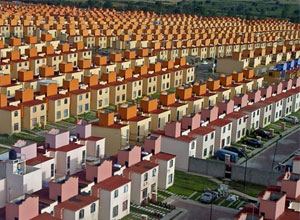Cruising these residential Sunday
streets in dry August sunlight:
what offends us is
the sanities:
the houses in pedantic rows, the planted
sanitary trees, assert
levelness of surface like a rebuke
to the dent in our car door.
No shouting here, or
shatter of glass: nothing more abrupt
than the rational whine of a power mower
cutting a straight swath in the discouraged grass.
But though the driveways neatly
sidestep hysteria
by being even, the roofs all display
the same slant of avoidance to the hot sky,
certain things:
the smell of spilt oil a faint
sickness lingering in the garages,
a splash of paint on brick surprising as a bruise,
a plastic hose poised in a vicious
coil; even the too-fixed stare of the wide-windows
give momentary access to
the landscape behind or under
the future cracks in the plaster
when the houses, capsize, will slide
obliquely into clay seas, gradual as glaciers
that right now nobody notices.
That is where the City Planners
with the insane faces of political conspirators
territories, concealed from each other,
each in his own private blizzard;
guessing directions, they sketch
transitory lines rigid as wooden borders
on a wall in the white vanishing air
tracing the panic of suburb
order in a bland madness of snows.



















